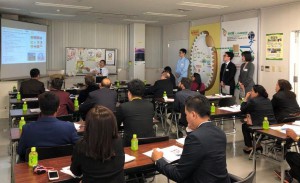
Select Page
A food value chain (FVC) is a series of connected activities to create and build value at every stage from agricultural production, manufacturing, processing, marketing, and distribution to consumption. As for value chains in other sectors, the environment in which FVCs function is changing. Higher incomes lead to greater demand for better-quality, safer, fresher food. Changing lifestyles mean more demand for healthy, convenient food and small-sized package delivery. Sustainable FVCs must deliver higher value and increase profits for each stakeholder from farm to fork while adapting to socioeconomic trends and the era of Industry 4.0.
 Japanese FVCs have taken advantage of ICT innovations to maintain food quality and safety, reduce delivery times and costs, and satisfy changing consumer demand. Their cold chain technologies for seafood and fresh fruit and vegetables are particularly advanced. Partially funded by a special cash grant from the Japanese Ministry of Agriculture, Forestry and Fisheries, the APO hosted a multicountry observational study mission (OSM) on Sustainable Food Value Chains in Japan, 22–25 April 2019. There were 16 participants from the targeted member countries Bangladesh, Cambodia, the ROC, Fiji, India, Nepal, Pakistan, the Philippines, Thailand, and Vietnam, all of whom were in positions to promote the adoption the best practices of FVC sustainability in their countries, ultimately enhancing the overall long-term competitiveness of their agrifood sectors.
Japanese FVCs have taken advantage of ICT innovations to maintain food quality and safety, reduce delivery times and costs, and satisfy changing consumer demand. Their cold chain technologies for seafood and fresh fruit and vegetables are particularly advanced. Partially funded by a special cash grant from the Japanese Ministry of Agriculture, Forestry and Fisheries, the APO hosted a multicountry observational study mission (OSM) on Sustainable Food Value Chains in Japan, 22–25 April 2019. There were 16 participants from the targeted member countries Bangladesh, Cambodia, the ROC, Fiji, India, Nepal, Pakistan, the Philippines, Thailand, and Vietnam, all of whom were in positions to promote the adoption the best practices of FVC sustainability in their countries, ultimately enhancing the overall long-term competitiveness of their agrifood sectors.
Reflecting the scope and variety of FVC technologies available as well as differences in consumer preferences in the Asia-Pacific, eight Japanese resource persons and a cold chain specialist from Singapore gave presentations and shared expertise during the OSM. Topics covered included Japan’s global FVC strategy, utilization of radio frequency identification (RFID) technologies, trends in FVCs and challenges in making them sustainable, features of FVCs in Asia, and digitization of fresh food transactions in Japan. Field visits showcased the production of prewashed rice, RFID-based food logistics operations, the facilities of a newly opened wholesale market, and how cold chains for perishables are maintained. The insights gained from those visits helped participants in devising their proposed future FVC action plans.